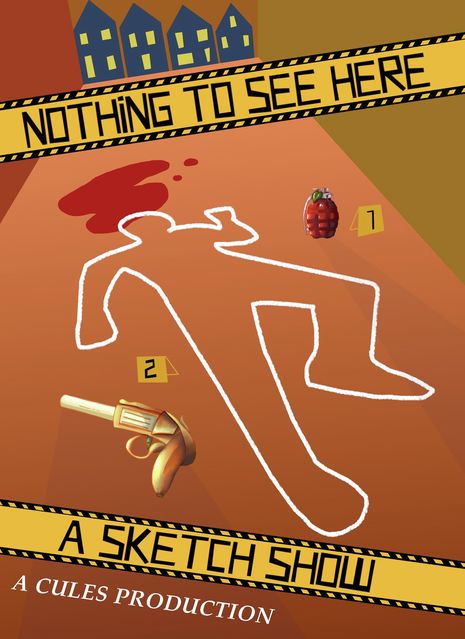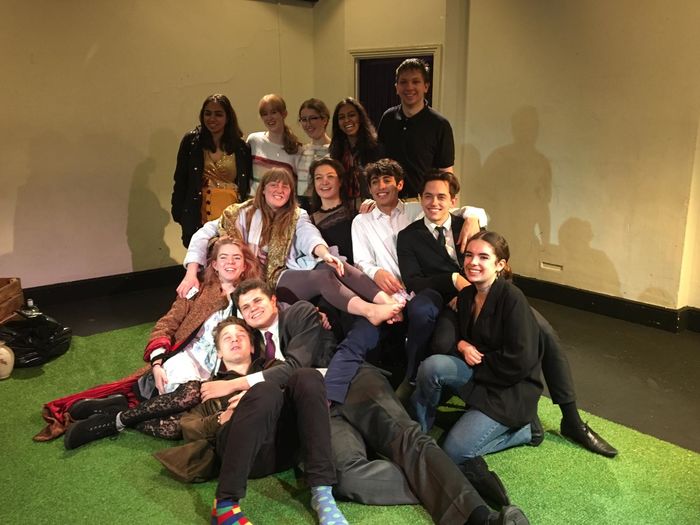Nothing To See Here: Strong Direction in a Mixed Bag of CULES Fun and Games
Will Jones praises Gregory Miller’s direction but questions other aspects of this ‘inconsistent and unpolished’ production.

In times of great darkness and uncertainty, there’s a place for deep-cutting political satire. But there’s also an equally worthy place for light-hearted fun, a bit of escapist merriment. The latest CULES production, Nothing to See Here is a radio sketch show (get it?) advertising itself as just that: ‘an hour of silly light entertainment’. And, thanks largely to Gregory Miller’s assured direction (assisted by Abraham Alsawaf, Val Gladkova and Anna Trowby) and generally slick production, it mostly lives up to that promise. It’s a little inconsistent and unpolished, but it’s a perfectly fine way to spend an hour and a bit.
Miller also makes frequent acting appearances across the programme, early on as the hilariously lecherous ‘Dave’, searching for a date online, but mainly as its fumbling radio DJ. The character’s recurring puzzlement and growing desperation at the various sketches is both an appropriate structural mould for the show, and one of its comedic highlights. About midway through the show, he morphs absurdly, and brilliantly, into an old-fashioned, plummy narrator, whose delightful, cheaply echoed pronunciation of the recurring ‘Haunted Hotel Room Sketch’ is itself the funniest thing about that entire sequence. This hammy stretch of overcooked horror is quite joyous, complete with some rather less civilised noise-making from Miller as a werewolf, accompanied by an organ and the atmospheric sound of a crackling fire and heavy rain.
The rest of the cast give reliably spirited turns, too. Highlights might include Emma Shen’s perverted online date Doreen, the over-egged pomp of Nathan Galpin’s salesman, who has some cracking lines about a vacuum cleaner, and Charlotte Vine’s resounding turn as a posh, desperately out-of-date fashion magazine editor. Even when some of these sketches rather outstay their welcome, the cast, on the whole, carry us through. A few of the accents inexplicably begin to wander mid-sketch, but a certain haphazard messiness is almost a requirement of these shows, and goodness knows, far greater comedic talents have stumbled at that particular idiomatic hurdle.
"May not be totally consistent in quality, but it succeeds in a consistently frothy tone"
Recognition must also go to Vine’s fine sound work, both the well-utilised sound effects, which strike the right balance of phony and convincing, and the seamless incorporation of the writers’ musical choices – aside from the horror sketch, there’s also the mock epic music accompanying the salesman’s grand romantic proclamation, and perfectly judged background music for the more casual scenes (though perhaps bringing in an original composer might have aided the show’s overriding sense of fun).
The writing, courtesy of Miller, Trowby, and Ido Rosen, is not quite so consistent. Too many of the sketches pass by without landing, or feel forced out of nothing, like the Diet Sketch. Others, like ‘Feminism 101’ and the one about ‘the ding’, find resounding laughs eventually, but only after a little too much baggage. In the latter case, there was a whole introductory section about ‘the Ding’ which never quite worked, but the sketch’s later movie-scene involving various fruit weapons, which bring about great damage (again, effective sound work) and hilarious, horrified reactions from various cast members doubling up in the background, was genuinely funny. For me, perhaps the single biggest laugh came during the Russian Roulette sketch: just as I was beginning to find the scene wearisome, it delivered a simple but brilliantly timed moment of black comedy, made all the funnier by the announcer’s continued bafflement at such a murder-filled line-up.
It all ends with a sweet bit of simple harmony, as the cast join together in song, initially criticising the director, until he casually threatens their families, and they switch to praise. It is a fittingly charming end. This is not a show aiming for acerbic bite. Even the mention of political figures – Thatcher, Boris, Theresa May – in one sketch feels totally harmless. Nothing To See Here may not be totally consistent in quality, but it succeeds in a consistently frothy tone, embracing a kind of over-the-top silliness which remains, for many, the defining trait of our national humour.
Sometimes, a handful of well-delivered jokes and an increasingly exasperated British broadcaster are all that’s required to just about get us through. When the potential customer tells the salesman that his product seems ‘a bit sketchy’, he replies, with the audio equivalent of a wink and a nod, ‘what else are you going to do with your time?’. Touché.
 News / Cambridge academics stand out in King’s 2026 Honours List2 January 2026
News / Cambridge academics stand out in King’s 2026 Honours List2 January 2026 Interviews / You don’t need to peak at Cambridge, says Robin Harding31 December 2025
Interviews / You don’t need to peak at Cambridge, says Robin Harding31 December 2025 Comment / What happened to men at Cambridge?31 December 2025
Comment / What happened to men at Cambridge?31 December 2025 News / Varsity’s biggest stories of 202531 December 2025
News / Varsity’s biggest stories of 202531 December 2025 Features / “It’s a momentary expression of rage”: reforming democracy from Cambridge4 January 2026
Features / “It’s a momentary expression of rage”: reforming democracy from Cambridge4 January 2026










